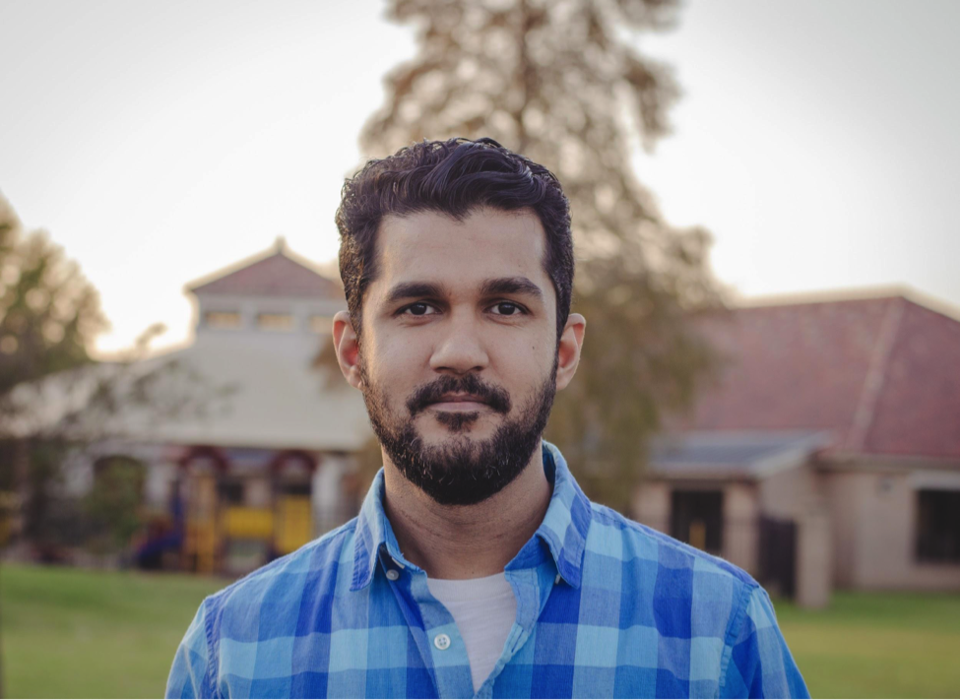2020 Winner
The LIGO Laboratory congratulates Siddharth Soni of Louisiana State University for winning this year’s LIGO Laboratory Award for Excellence in Detector Characterization and Calibration for his outstanding work to reduce transient noise due to stray light in the Advanced LIGO detector at LIGO Livingston Observatory (LLO) during the Observing Run O3.

Siddharth Soni is a graduate student in the Department of Physics at Louisiana State University. He will graduate with his PhD in physics in Spring 2021. He received a Bachelor's degree in Mechanical Engineering from NIT Bhopal. As a part of the LSC, his research is on increasing the sensitivity of the LIGO detectors and employing Machine Learning to recognize noise artifacts in the data. He is also interested in learning more about the next-generation gravitational wave detectors and what they would tell us about our Universe. Apart from his work, he enjoys road trips, hiking, and visiting national parks. (Photo: Kevin Jacob)
While investigating noise in LLO data due to light scattering from reflective surfaces inside the vacuum enclosure, Soni found a strong correlation between light scattering features in the gravitational wave (GW) data and the motion of one of the suspension systems supporting an interferometer optic. This correlation indicated a likely light scattering path between the optic and the thin gold electro-static drive used to control the optic’s motion. Soni demonstrated that a new method to track and account for this relative motion resulted in a decrease of up to 100x in the rate of noise due to this type of light scattering, and a significant decrease in the overall rate of transient noise at LLO. Soni also identified an additional light scattering path related to a nearby motor system as an additional source of light scattering noise. To reduce the noise due to this relatively weaker source, Soni characterized an additional tracking method that has been tested at LLO and is ready for use during the next observing run.
Soni also investigated a second source of light scattering noise at LLO, so-called fast scattering, which presents as a higher frequency, altered form of light scattering in GW data. He trained GravitySpy’s machine learning algorithm to recognize fast scattering and used it to reclassify O3 transient noise data. Soni correlated the resulting data with ground motion in different frequency bands, which led to Soni’s discovery of two distinct types of fast scattering with sources that each couple differently with ground motion. This new, enhanced understanding of light scattering in LIGO detectors will be crucial for future observing runs.
Soni’s work is a major success for the greater LIGO Detector Characterization effort. Identifying noise transients, linking them to particular interferometer conditions, and eliminating the source of the noise is the most effective path to improved detector sensitivity and greater astrophysical discovery potential for LIGO. Soni’s work directly reduced one of the most challenging sources of LIGO transient noise, one associated with multiple retracted LIGO-Virgo candidate event alerts, and allowed the confident detection of subsequent distant, weak GW signals.
Soni will receive a $1000 prize and will present an invited seminar at one of the LIGO Laboratory sites (LIGO-Hanford, LIGO-Livingston, Caltech, or MIT) to share his achievements with LIGO Laboratory members. Soni will also receive an award certificate at the LIGO-Virgo Collaboration meeting in March 2021.
Read more about Siddharth Soni's work:
[1] S. Soni et al. "Reducing scattered light in LIGO's third observing run." (2020) Preprint: arxiv.org/abs/2007.14876
2020 Honorable Mention
The LIGO Laboratory is also pleased to recognize four other projects as meriting honorable mention:
Dripta Bhattacharjee and Sudarshan Karki (Missouri University of Science and Technology) -- for studies that characterized and reduced uncertainties in the LIGO detector photon calibrator systems to sub-percent accuracy for Observing Runs O2 and O3.
Laurence Datrier (University of Glasgow), Timesh Mistry (University of Sheffield) and Michael Ross (University of Washington) -- for the development, deployment, and commissioning of a novel absolute calibration system via direct gravitational forces, a ‘Newtonian Calibrator’, to provide increased confidence in the absolute calibration of LIGO detector data in future observing runs.
Patrick Meyers (University of Melbourne) -- for the characterization of sources of noise limiting to stochastic background gravitational-wave searches in previous and future observing runs.
Ethan Payne (Monash University) -- For improved incorporation of physical models of systematic error in calibration with astrophysical source parameter estimation, modeling the impact of this systematic error on past GW events, and providing the groundwork for understanding the impact on conclusions from future populations of GW events.



